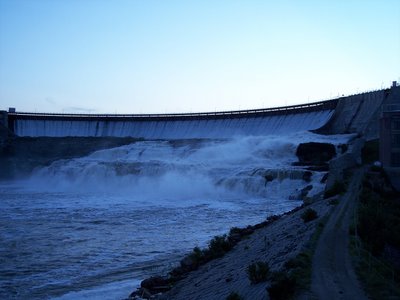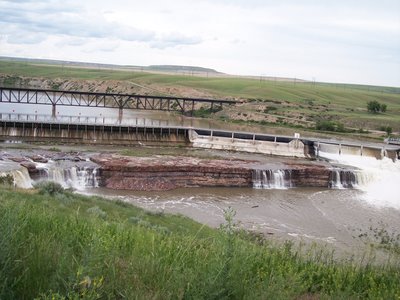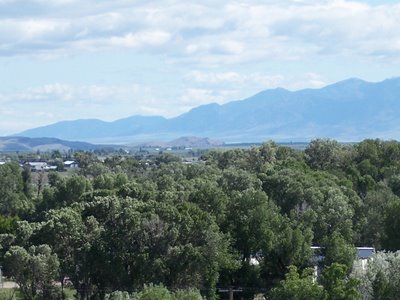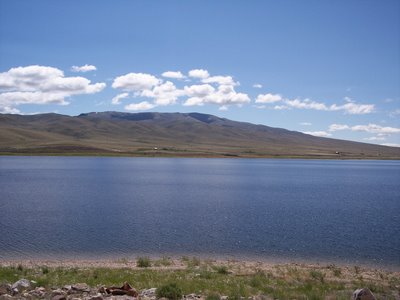Vicissitudes and Victories
Friday, June 30, 2006
A Tale of Two Nations
I thought that now would be an appropriate time to ponder the nature of the United States and its history. As an American historian, I spend significant amounts of time pondering over the history of this nation and what that history means. 230 years ago a group of outlaws (the Continental Congress) came together after weeks of debate to sign a document that declared the reasons and the logic behind the decision made by thirteen small and diverse colonies to declare themselves independent from the king of England. Although the introduction contained one of the foremost treatises ever written about the rights of man, the main document primarily enumerated the reasons why the American colonists felt that King George III was acting tyrannically. One of Thomas Jefferson's original reasons for independence accused the king of propagating the vile and evil slave trade, this reason was conveniently removed by a slave supporting Congress. Yet the Declaration of Independence does represent one of the most eloquent discussions of what human beings should seek after from a government. It espoused the idea that all men were created equal and that they should receive protection from a government to do those things they deem correct and good as long as those things don't infringe on the rights of others or are morally wrong. It was a revolutionary indeed for the government of any state, however small and inconsequential, to embrace such principles as part of its foundation. The inclusion of such ideas in a government's philosophy was unthinkable before the American Revolution.Over time, we as Americans have sometimes done well embracing the idealistic identity created for us by the Declaration of Independence. When the government was formed, these principles were only seen as applicable to white, property-owning men. As the nation expanded and the working population grew, the government, especially under the administration of Andrew Jackson, began to recognize all white males as being worthy of governmental participation. The Civil War expanded sovereignty and suffrage, at least in precept, to black men as well. In practice, blacks would live as second class citizens for years to come. Only when the courts and presidents threatened segregationalists with military intervention in the 1950s and 1960s did blacks begin to find true and equal protection under the law.
In 1848 a group of women gathered at a convention near Seneca Falls, New York and created a declaration proclaiming that the rights espoused by the Declaration of Independence should be extended to women as well. Women were emboldened by the critical role they had played in the Temperance and Abolitionist Movements. In the Seneca Falls Declaration, women declared, "We hold these truths to be self-evident: that all men and women are created equal." Once again, this declaration primarily represented white, middle-class women. Not until the 1970s would most women receive the same rights espoused in the Declaration of Independence that men had enjoyed for generations.
Minorities have lived as second-class citizens for the majority of the history of the United States. Blacks were enslaved and segregated. Asian immigrants could not legally become citizens until 1953. In the 1930s, the government deported Mexican American citizens to Mexico and in the 1940s they imprisoned Japanese American citizens for having the faces of the enemy
But why focus on the dark spots in our nation's history? Am I just opening old wounds? Isn't the United States the greatest nation in the history of the world? Through all of its faults, I do believe that the United States has been one of the most just nations to its people in the history of the world. When compared to other nations, we probably exercised less bigotry and hatred than any other major nation in the modern world. Yet focusing only on our strengths can blind us to the many weaknesses evident in the United States's history and present. The narrative I previously presented was meant to illustrate that the story of the United States is not only a story of freedom and liberty, but of racism and prejudice. So many people only understand the "what's", but not the "why's" of racism and prejudice, and so they don't understand why they are so important.
Racism defined is any thought, word, or deed that establishes, reifies, or ignores social hierarchies based on race. Thus, anything we do, say, or think that implies that people of another color are not as good as we are is inherently racist. Race is not just about color. It is about culture and class. If we attack another race's culture or class dynamics as being inherently inferior we are being racist as well. The funny thing is that these racial hierarchies become as ingrained in the minds of minorities as in the ideas of people not of those minorities. I think that racism is actually on the decline in American society. Less and less people consciously believe that people of other races are either superior or inferior.
Prejudice, on the other hand, continues to run rampant in our society. Prejudice defined is the assumptions we make about other people's humanity without knowing them. Prejudice is sneaky. It creates ideas like Asians are smart, and Mexicans are lazy. People begin to believe that gangs are just for minorities and only black children grow up in single parent homes. The funny thing about prejudice is how pervasive it becomes; how easily it is to pin assumptions about a person's race to people in general. Because most blacks score lower on test scores, they must be stupid. Therefore, my black friend must either be stupid, or he is an exception to the rule. These prejudiced assumptions come to pervade the thoughts of everyone and are not exclusively directed toward people of other races.
All racism is based on prejudice, but not all prejudice is based on racism. We all have prejudices, though we might not all be racists. The incredible thing about prejudice is that although it is almost universally pervasive, it easily disappears. Prejudice cannot exist when we see someone else as being equally as human as we are. This is why diversity is a good idea: because it breaks down barriers of prejudice if we'll let it. On the other hand, affirmative action is a policy about race. It seeks to reconstruct racial hierarchies in employment and education, but in doing so is it embracing prejudiced assumptions? I hope that I am giving just a taste of how complex and complicated the world of race and ethnicity can be. No wonder politicians have historically had an incredibly difficult time dealing with either prejudice or race.
Do I think we, as a nation, are doing better? I hope so. I know that the Declaration of Independence and the Constitution give us a framework for tolerance in good government. I believe in the ideas of liberty and freedom. We need to judge each of our nation's present policies against this framework. We must search and destroy the vestiges of racism and prejudice passed on to us by those with less informed ideas about others. This is how we honor the idea of America, and this is how we will come to live what we believe. God bless America!!!!!!
Improving Your Marriage

You might want to check out this very funny take on improving marriage relationships in the New York Times. You will see the similarities between men and shamu the killer whale.
Thursday, June 29, 2006
The Messiah
I really don't think there is a better experience than singing the amen chorus from Handel's Messiah with a full choir. The perfect fugues creates a synergy unmatched in any other group endeavor. The choir also gets the chance to put forth their approval of the Savior's life and atonement as they sing the word amen in many different ways and at many different times. At the end they all come together for one grand and powerfully moving final amen. It always brings chills to my spine and a tear to my eye to feel such approval, love, and gratitude for the Lamb.Love Means Circling the Wagons
Many of my recent posts have dealt with the nature of romantic love, but today I have been thinking more about love in general. I look to the Mormon pioneers for an object lesson about life. Each night as they set up camp they would circle the wagons in the wagon train in a way that would provide protection for the people and the animals inside the circle from any animals or people with bad intentions.I was thinking today about how people that truly love each other circle the wagons of support when faced with troubled times. I find it odd, and yet wonderful that people that love each other grow closer through hard times. I think the firmest definition of love is a willingness to suffer pain, disappointment, and misunderstanding together.
Wednesday, June 28, 2006
Love (and its imitators)
My girlfriend and I went to see a romantic comedy tonight called The Lake House. It really told a touching story of how two people connected with one another even though they were separated by time. These two people came to know and love one another by writing letters to each other. At the very end of the movie they are united in a magnetic scene when the guy, Keanu Reeves, embraces the girl, Sandra Bullock, and they kiss passionately letting the audience know that they will live happily ever after.After the movie, we went on a walk, and my girlfriend told me that the movie perpetuated some deeply held stereotypes the world has about love. She said that when girls watch too many romantic movies, they come to expect the type of romance portrayed in these movies. They come to think that love is about longing and finally finding. It is about passionate kisses that come after someone decides they cannot live without someone else. It is about handsome men chasing their princesses.
We decided that this might portray one aspect of love, but it is the most shallow part. Every relationship does have those big, life-changing moments when a couple realizes that they genuinely care for each other. They realize that each for the other is like water that quenches some deep thirst. The thing that the movies don't show well is that these monumental events only occur when they are built on thousands and even millions of microscopic moments. Affection is created and consummated as two separate people slowly begin to merge their individual lives. This merging occurs moment by moment until there comes a time when they realize they care for and want to serve one another as much as they care for and serve themselves. That is how love truly occurs, and that is what the movies will never really be able to portray.
Tuesday, June 27, 2006
Frustration
Today I am just frustrated with myself. I have had the last week off from work, and I have very few pressing things to do. I really have just lounged around quite a bit for the last few days. Having my car broken down doesn't help at al either. When I first got done with my job I felt like I just needed some time to decompress from the stress of a school and all of the emotion and trauma I felt over the past year. Now I am just ready to do something. I am setting goals, and I am going to keep them. The time for action is now, and I am ready and willing to throw myself into all that is virtuous, lovely, of good report, and praiseworthy. Wish me luck.Monday, June 26, 2006
$1100
My car needs $1100 worth of repairs. It's enough to make someone a fan of public transportation.More Thoughts on My Car
"Security is mostly a superstition. It does not exist in nature...life is either a daring adventure or nothing."(Helen Keller)
Sunday, June 25, 2006
Another Vicissitude
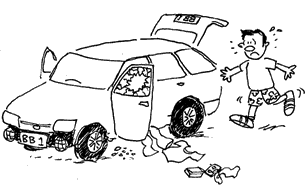
Tonight my girlfriend and I came home to Logan after a visiting with her parents in Hooper, Utah. As we pulled into my driveway, I exited my car and heard a spewing sound coming from beneath my vehicle. When I looked underneath, I saw a large amount of water/antifreeze draining out of what appears to be the engine block. I think my water pump might have gone out. Oh well, at least it didn't go out while we were on the road. I also don't have to work this week, so I have time to have my vehicle fixed without facing major transportation issues. Even at their very worst, the vicissitudes of my life have always been pretty minor. I guess tomorrow I get to see how much money this particular vicissitude will cost me. Wish me luck.
Saturday, June 24, 2006
A Wonderful Night



Tonight my girlfriend and I went on a date to a place named Tony's Grove high up in Logan Canyon. Truth be told, we didn't go all the way up to Tony's Grove; instead we pulled off along the road and hiked up a trail to a meadow that was completely isolated from the rest of the world. We had dinner there. Dinner consisted of a pizza plus fresh strawberries and cherries for desert. After dinner, we decided to take a variety of pictures of each other in the woods. It was absolutely beautiful up there, and we had a wonderful time. I can't help but think that this relationship is going very well! The pictures included are of some flowers that I photographed while in the woods.
Friday, June 23, 2006
About Me
There is one sure fire way to know what I'm thinking about intellectually at any given time: go into my bathroom and see what books I have stored there. Right now you would find a book named Colorado's Japanese Americans: From 1886 to the Present, the latest copy of the Church of Jesus Christ of Latter-day Saints' magazine the Ensign, a missionary manual called Preach My Gospel, and a book named Contemporary Asian America: A Multidisciplinary Reader.Thursday, June 22, 2006
My Lot as a Historian
"Pero uno es escribir como poeta y otro como historiador: el poeta puede contar o cantar las cosas, no como fueron, sino como debian ser; y el historiador las de escribir, no como debian de ser, sino como fueron, sin anadir ni quitar a la verdad cosa alguna.""But it is one thing to write like a poet, and another like an historian: the poet may say or sing things, not as they were, but as they ought to have been; and the historian must write things, not as they ought to be, but as they have been, without adding or taking away aught from the truth."
(Don Quixote de la Mancha , Book Two, Chapter Three)
Wednesday, June 21, 2006
The Future
As a historian who deals primarily with the past, I am not very good at being prophetic. Historians are notorious for seeing the world as a complex and ambiguous place. It is really hard for us to know anything for sure, or at least that's what we like to tell ourselves. Tonight the uncertainty in my life became a whole lot clearer. A new option appeared to a problem that I thought had no good solution. It is because a certain young lady is willing to do a lot more than I would ever ask her to do. I must say that the future is appearing brighter for this historian, mostly because I am certain about the way I feel for a certain young woman in my life.Tuesday, June 20, 2006
Levels of Love
My girlfriend and I have been talking lately about the nature of love and how to define it. I feel like I'm starting to gain a better perspective about love because I have been in three serious relationships in the past year. I think the thing that I've learned most is that there are many levels of love and many different types of love. When someone tells someone else that he/she loves him/her, it can mean many different things. Falling in love is a different experience for each person. I really don't believe that there is one way to fall in love. I think there is really only one constant in the realms of love, and that constant is God's love for his children. All other ways of loving fall somewhere beneath the pure love of Christ. Love is specific to the situation in which it finds itself. Loving someone in one moment may consist of holding them close in your arms, at another moment it might mean letting someone go, and at another moment it might mean that intimate physical expression of love reserved for happily married husbands and wives.One thing I do know is that love is a verb. Love compels us to action-- to serve, and nurture, and change. So what does it mean to "be in love"? I don't think it is ever the same for any couple. Television and movies often portray love as a physical force that draws two people together with such magnetism that they cannot live without one another. While I think that this accurately portrays one aspect of being in love, I also think it is the weakest and most insignificant part. Love is about putting the needs of someone else ahead of your own needs. Love is about giving without ever expecting anything in return. Love is about doing what's right, no matter the consequences that follow. Love is about becoming what the other person needs--about sharing joys and sorrows. Love completes and complements; it edifies.
So where do these truths about loving leave all of us negotiating love's battered landscapes? I don't really know. All I know is that I love, and because I love I find meaning and purpose in my life.
Monday, June 19, 2006
Tonight

There comes a time in every enduring relationship when both parties are inexplicably changed forever. That moment came tonight.
Saturday, June 17, 2006
Following the Footsteps of Lewis and Clark
Clark's and Lewis's Route up the Missouri River. My group traveled the part of the trail that wound through Montana.
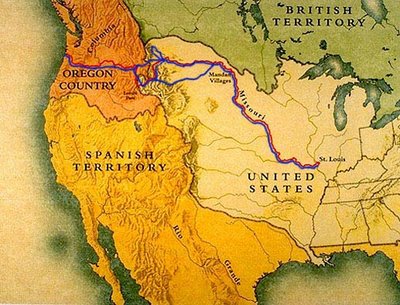
A Great Rhetorical Truth
I find great comfort in the fact that the process of simply ennumerating and stringing together exceptions does not create a new argument.My Trip With the Corps of Discovery
I recently returned from accompanying a group of teachers on a field trip to retrace part of the route taken by the Lewis and Clark Expedition as the explored the American West. These famed explorers were the vanguard of the United States's imperial movements westward. Historians have embraced the party's courage and resolve and the Corps has become part of our great nation's creation myth. While I join many Americans in celebrating the 200th Anniversary of Clark's and Lewis's famous endeavor this year, we all must always remember that the explorers did not come to an empty wilderness. There were people in Lewis's and Clark's West, people with complicated cultures and societies. Clark's and Lewis's initiation on such an epic journey enacted significant changes to American Indian culture and destiny. Even in this ultimate exploration for American freedom could be found Clark's slave, York. As Americans we need to acknowledge the sticky and complicated past of our own nation. Sometimes its past is wrought with ambiguous meaning. Although the Clark and Lewis Expedition obviously represented the grandeur of American expansion, it also represented the oppression of an entire native tradition--a tradition changed permanently for good or for ill.Thursday, June 15, 2006
Flag Day
This Flag Day, as you ponder the significance of the stars and stripes, remember that much good and much bad has been done in the name of that flag. Those colors flew as American soldiers liberated the Jews within the concentration camps of World War II. Yet the same colors flew over the incarceration camps created to imprison good Japanese American citizens simply for wearing the faces of the enemy. The same flag that forced Southern schools to desegregate, also killed thousands of Filipino nationalists that fought against American imperialism in their country over fifty years.As we ponder the red, white, and blue, it is imperative that we consider what the flag should mean. It has become a great symbol of life, liberty, and the pursuit of happiness. Only as our nation's actions are guided by such idealistic ideas, will we truly honor the flag and the country it represents.
Wednesday, June 07, 2006
Monday, June 05, 2006
History
I went to some great lectures on the teaching of American History today and I was reminded of one of the truly great truths inherent in the study of the past. Individuals are history, each person affects the world in his own unique and important way, however small. Each person in the world also lives in history. Each of us is affected by the world in which we live and we frame our lives in that context. Historians constantly negotiate the interplay between the history made by individuals and the history that made those individuals. The balance that we find determines the way that we write about the past.Friday, June 02, 2006
Details
"God is in the details."( Ludwig Mies van der Rohe)
This quotation, attributed to an architect proclaims the importance of detail work. Today I spent many hours working through the formatting details of my Thesis so I can turn it in to the graduate school. I find this detail work tedious and frankly, quite unfulfilling, but I always remember the aforementioned quote whenever I am ready to give up. I do believe that we can find evidence of God in the smallest, most insignificant moments of our lives. He really does care about us, as insignificant as we might seem in the greater scope of creation. I believe that his example beckons us to care more about the small details of our own lives.

